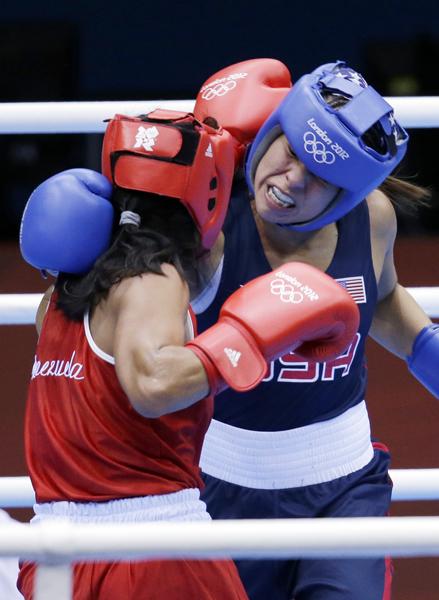
Marlen Esparza won a bronze medal in the London 2012 Olympics. (Associated Press)
College Hispanic American Students (CHAS), Multicultural Student affairs, and the Women’s Center brought Olympic boxer Marlen Esparza to the SMU campus Monday evening. Esparza used her boxing experience to teach audience members how to knockout stereotypes and insecurities.
As she walked to the podium, it was hard to believe that this 5-foot-3-inch woman sponsored by Coca-Cola, CoverGirl and Nike holds the highest winning record of all male and female boxers. Esparza began her lecture recounting her biography and plans for the future.
Esparza began boxing when she was only 11 years old. She and her father used to watch boxing all the time and were big fans of Mexican boxer Julio Cesar Chavez, Jr.
“I used to think that watching boxing was what everyone else did, that it was normal and that Chavez was boxing,” Esparza said.
Esparza’s father wanted her two brothers to become professional boxers. The two brothers tried the sport, but did not want to make a career out of it. Esparza saw this as the perfect opportunity to enter the ring.
Esparza asked her father to let her watch her brothers practice. Instead of sitting on the sidelines, she approached a coach and asked him if he could train her. The coach, underestimating her potential because of her gender, redirected Esparza to his assistant.
Esparza went to the gym every day. Her determination managed to get the coach’s attention and he later agreed to train her. The sport turned into Esparza’s passion and life. She sacrificed unhealthy food, partying, school and other activities to become the No. 1 boxer in the United States.
Even though she made the audience laugh for most of the evening with her “brutally honest” personality, she also put the audience in an emotional mood when she talked about her hard moments in life. As a Hispanic woman, she had to overcome both racism and discrimination in a largely male dominated sport.
“When I was 18 years old I had a lot of problems; my boxing wasn’t going well,” Esparza said. “I didn’t know if I was doing the right thing and I got really depressed to the point where I was contemplating suicide.”
Esparza urged the audience to pursue their dreams even if “it doesn’t make sense to the rest of the world.”
“Even though people can’t see your vision,” she said, “if you keep doing it, they will eventually get it.”
Esparza said that success can only be achieved after failure, and when family and God are used as main motivations. She overcame her insecurities and fought against stereotypes that were holding her down to make female boxing a respectable sport.
The bronze medalist redirected her attention to the audience by telling them to raise their hands if they were the first students in their families to attend college. At least half of the room raised their hands.
“That right there is beautiful, it just says so much and is worth everything,” Esparza said.








